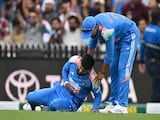Less than a week after India voted in favour of a United Nations resolution calling for an immediate ceasefire in Gaza, Prime Minister Narendra Modi on Tuesday said he has spoken to his Israeli counterpart, Benjamin Netanyahu, and highlighted New Delhi's stand in favour of early restoration of peace in the region.
The PM said that, during the "productive exchange", the two sides also discussed "shared concerns" on the safety of maritime traffic in the region in the wake of the Israel-Hamas conflict. In the past few weeks, there have been several instances of attacks on cargo ships in the key Red Sea shipping route, prompting fears of a major disruption to international commerce.
According to the health ministry in Gaza, at least 19,600 people - most of them women and children - have been killed in Israeli attacks on the strip of land since October 7, when Hamas launched a multi-pronged attack on the Jewish country, killing around 1,200 civilians. Around 240 people had also been taken hostage.
In a post on X, formerly Twitter, PM Modi said he had reiterated India's "consistent stand" which also calls for stability in the region and humanitarian assistance for those affected by the conflict.
"Had a productive exchange of views with PM @netanyahu on the ongoing Israel-Hamas conflict, including shared concerns on the safety of maritime traffic. Highlighted India's consistent stand in favour of early restoration of peace & stability in the region with continued humanitarian assistance for the affected," PM Modi said in the post.
Shipping Concerns
According to a report by news agency Reuters, many container ships are anchored in the Red Sea and others have turned off tracking systems as traders adjust routes and prices in response to maritime attacks by Yemen's Iran-aligned Houthis on the world's main East-West trade route.
The Red Sea is linked to the Mediterranean by the Suez Canal, which creates the shortest shipping route between Europe and Asia. About 12% of world shipping traffic passes through the canal, including a portion of the trade to India.
On Tuesday, US Defense Secretary Lloyd Austin announced the creation of a multinational operation to safeguard commerce in the Red Sea in response to the Houthi attacks.
Houthi rebels attacked two commercial shipping vessels in the southern Red Sea on Monday and missile attacks had been carried out on two ships on December 15 as well.
According to news agency AFP, the Houthis have said they were targeting vessels near the Red Sea's strategic Bab al-Mandab strait to pressure Israel over its devastating war with Palestinian Hamas militants in the Gaza Strip.
The handle of the Israeli prime minister's office also posted about the conversation between PM Modi and Mr Netanyahu and said that the two leaders "discussed the importance of securing freedom of navigation in the Bab-el-Mandeb".
“Prime Minister Benjamin Netanyahu spoke today with Indian Prime Minister @NarendraModi. The two leaders discussed the importance of securing freedom of navigation in the Bab-el-Mandeb, which is threatened by the aggression of the Houthis, instigated by Iran,” the Israeli prime minister's office posted on X.
UN Resolution
Last week, India was among the countries that voted in favour of the United Nations General Assembly resolution, 'Protection of civilians and upholding legal and humanitarian obligations', demanding an immediate humanitarian ceasefire in Gaza. As many as 153 countries voted in favour of the resolution, while 10, including US, Israel and Austria, voted against it and 23, including Germany, Argentina and Ukraine abstained from voting.
This had come at a time when US President Joe Biden had told a campaign event in Washington that Israel had "most of the world supporting it" after the Hamas attack. "But they're starting to lose that support by the indiscriminate bombing that takes place," he had said.
Other Israeli allies, Australia, Canada and New Zealand had also issued a joint statement and called for a ceasefire, saying that civilians and civilian infrastructure must be protected and that Israel must respect International humanitarian law.
PM Modi was one of the first world leaders to condemn the October 7 attack on Israel and also came out in strong support of the country. With the subsequent war stretching on for months, India has appeared to recalibrate its approach keeping in mind its historical stand on Palestine and a two-state solution, as well as its other relationships in the Middle East.















